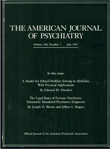Schizophrenia and the myth of intellectual decline
Abstract
OBJECTIVE: The authors' goal was to investigate the issue of intellectual deterioration in schizophrenia. METHOD: They examined the childhood IQs of adult patients with schizophrenia who had attended a child psychiatry service where measurement of intelligence was routine. Follow-up IQs of 34 of these patients were obtained an average of 19.4 years later. RESULTS: The mean child and adult IQs were greater than one standard deviation lower than those of the general population. There were no significant differences between the child and adult IQs, however, suggesting that the impairment in intelligence during childhood was stable over the follow-up period. CONCLUSIONS: The deficit in intellectual function observed in these patients, and reported in the literature, is lifelong and predates the onset of schizophrenia.



